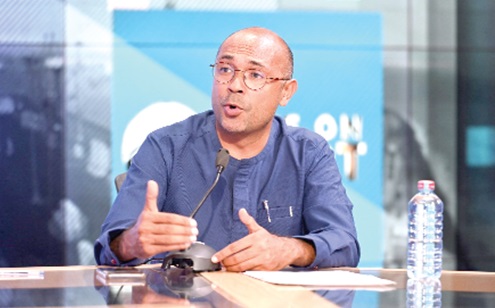The European Union (EU) has announced over €1billion in infrastructure and development investments under the ‘Team Europe’ initiative for the period of 2021 to 2027 to boost its strong economic partnership with Ghana.
Team Europe Initiatives (TEIs) focus on identifying critical priorities that constrain development in a given country or region, where a coordinated and coherent effort by ‘Team Europe’ would ensure results with a transformative impact. They are a practical illustration of how EU priorities are turned into concrete results on the ground.
Team Europe consists of the European Union, EU Member States including their implementing agencies and public development banks, as well as the European Investment Bank (EIB) and the European Bank for Reconstruction and Development (EBRD).
Team Europe approach
This ‘Team Europe approach’ means joining forces so that our joint external action becomes more than the sum of its parts.
By working together and pooling our resources and expertise, we deliver more effectiveness and greater impact.
Team Europe was initially put in place to ensure a coordinated and comprehensive response between the EU and its Member States to the COVID-19 pandemic and its consequences.
The EU, alongside member states such as Germany, has significantly scaled up its financial commitments to Ghana across strategic sectors, including energy, health, trade, security and education.
At this year’s Europe Day celebration in Accra, the EU Ambassador to Ghana, Irchad Ramiandrasoa Razaaly, disclosed that “between 2021 and 2027, Team Europe will invest no less than €1billion – approximately GH₵16 to GH₵17billion into infrastructure and development projects in Ghana.

Europe Day event
The Europe Day event is held annually on May 9. It commemorates the 1950 Schuman Declaration and celebrates European unity.
This year’s occasion served as a platform to strengthen diplomatic and commercial ties between Ghana and the EU, as well as to highlight the EU’s role as a reliable partner in Ghana’s socio-economic development.
The EU recently allocated €55million of grants, in collaboration with its German partners, to help position Ghana as a continental hub for vaccine production as an additional €62million is being channelled toward the long-anticipated retrofitting of the Kpong Dam, a key infrastructure project expected to boost energy resilience.
These major undertakings underscore the importance of investment in realising transformational projects under the three pillars of the EU’s development approach in Ghana: infrastructure through the Global Gateway Initiative, security cooperation and education.
Investment initiative
Through the Global Gateway – Europe’s strategic investment initiative the EU– and its member states are supporting the construction of smart, sustainable cities in Ghana, with expanded access to energy, clean water and sanitation.
On the security front, the EU has provided € 50 million in military equipment and training, backed over 30 security-focused projects and maintained joint maritime operations with the Ghana Navy in the Gulf of Guinea.
With education, the EU is investing in skills development and expanding student exchange programmes to empower Ghanaian youth.
Addressing the evolving global economic and geopolitical landscape, Ambassador Razaaly stressed the importance of cooperation based on shared values, saying: “In times of global uncertainty, Europe remains an anchor of stability – a place of opportunity and protection for its citizens”.
The EU and its institutions are working towards the common goal of ensuring prosperity and competitiveness, guaranteeing our security and defence, while upholding the fundamental values Europeans care about. Together with Ghana, we aim to address challenges that no nation can solve alone. This is the essence of our shared commitment to multilateralism.
Business Forum
The Ghana-EU Business Forum offers a platform for active participation between European and Ghanaian private sector operators and policymakers.
The forum, which is the 3rd Edition, represents a renewed opportunity for the EU, its Member States and the private sector from Europe and Ghana to engage on their investment agendas transparently and inclusively, intending to foster confidence and commitment to a stronger and sustainable partnership.
This year’s Ghana – EU Business Forum comes off on May 20-21. It is a highlight for the European Union, as it serves as a vehicle to realise the EU Global Gateway.
Under its Global Gateway policy, the EU and Member States have invested over €800 million, about 13 billion Ghanaian cedis, in large-scale infrastructure, notably in the energy, health and transport sectors.
Deepening cooperation
The theme of this year’s Ghana – EU Business Forum speaks for itself: ‘Deepening Ghana – EU Cooperation on trade and investment in non-traditional value chains under the EU Global Gateway Strategy’. This theme confirms the EU’s commitment to Ghana; a commitment that stands strong through decades of deepening partnership.
In Ghana, the European Union works in a Team Europe spirit, mobilising the full force of the European Union, Member States and institutions, including financial institutions.
Team Europe offers an elaborate network of connections and funding that harness faster GDP growth and private sector development in Ghana.
The Ghana – EU Business Forum is a vibrant convergence of vision, ambition and actionable partnerships, embodying the spirit of the Global Gateway Strategy in real-time.
Today, we celebrate together with the Private Sector operators from both Ghana and the EU, who are here to look for opportunities, learn more about priority sectors, find business connections, find investors and, above all, strike deals.
Visionary leadership
The Ghana – EU Business Forum results from months of dedicated preparation behind the scenes, working hand-in-hand with the Government of Ghana.
To our partners in the Ghanaian government, I extend my wholehearted thanks for your unwavering commitment and visionary leadership.
The EU Ambassador in as address was incredibly proud to present the Ghana – EU Business Forum 2025, especially as he will be leaving Ghana later this year for a new post.
The EU and Ghana share strong bilateral relations characterised by economic partnership, trade and mutual political cooperation.
The EU is Ghana’s largest development partner, and their relationship is strengthened by various agreements and initiatives, including the Economic Partnership Agreement (EPA). Key areas of collaboration include trade, economic development, regional security and sustainable development.
